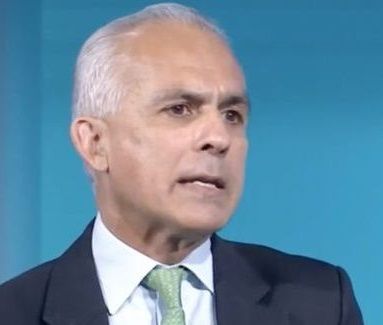Matt Goodwin: On Britain’s Cultural Revolution and Combatting the Stifling Politically Correct Culture
Matt Goodwin was 100% right in his address to the Reform UK Conference 2023. There's a massive new centre ground of British politics being formed.
Matt Goodwin, writer and professor of politics in the School of Politics and International Relations at the University of Kent, expressed it perfectly in his speech to the Reform UK Conference 2023. “We’ve allowed an extremely insidious form of socialism to take root in Britain. An extreme form of socialism called ‘woke’ has grown like a cancer at the heart of Britain. Nobody asked for it, no-body voted for it, yet it dictates our every move.”
Sometimes it feels a bit like a steel fist in a satin glove, or the velvet revolution that overturned the East European former Communist states in 1989: transfer of power and major political change without so much riots and protests, but with communication tactics and ideas as the catalysts. The only difference is that whereas the symbolic jangling of keys in the then Czech Republic were about freedom and doors opening, today we have a revolution of doors closing and freedom being curtailed.
Indeed what’s happening in the UK today is very much about the founding principles of Reform UK, and going back before that, the Brexit Party. If the ruling class in this country had really understood what Brexit was really all about - lowering immigration, levelling up the country, controlling the borders, pushing back on tax and regulation, reforming the institutions, giving people a voice – then there wouldn't be need for a party like Reform UK. That's the reality of the situation. And there’s a reason why all of those things did not happen.
They didn't happen because Britain now is in the grip of a new political and cultural class that doesn't really have much of an interest in the rest of the country. If anyone has engaged with any of Matt Goodwin’s research and work, you will know that most of our institutions today are disproportionately dominated by people from the same backgrounds, who hold the same values. These people look at other ordinary people and ordinary voters in the country with bewilderment and confusion. These elites are re the most politically intolerant of all, as we saw with the de-banking scandal brought to light by Nigel Farage and others. These are the people in society the most likely to say they would feel uncomfortable if their son or daughter married somebody who held different political views to their own.
What’s more this new elite that is dominating our institutions has lost touch with the rest of the country. And we can see that in a whole array of issues from immigration, to the national borders, to what we're teaching our kids in school.
There's a massive new centre ground in British politics
Matt Goodwin’s latest book is ‘Values, Voice and Virtue: The New British Politics’. He is also the co-author of ‘National Populism: The Revolt Against Liberal Democracy’ and author of other books on politics at the margins and the phenomenon of Brexit. Since 2008 he has been co-editor of the Routledge book series on Extremism and Democracy. Between 2011 and 2015 he served as a member of the UK government’s working group on anti-Muslim hatred. Between 2013 and 2016 he was a trustee and member of the executive committee of the Political Studies Association.
Matt is 100% right when he says there is a new centre ground of British politics being formed, even if both the main legacy political parties have yet to fully comprehend it.
What worries a lot of people more than anything is what we see in the universities, the cancel culture and the erosion of freedom of speech and freedom of thought. We’ve seen university campuses and student societies banning spokespeople from the right of the political spectrum when they don’t conform to approved types of speech. It’s what anyone will see looking at the public sector institutions and what we see when looking at the governing Conservative Party and the Labour Party.
Saying a woman is a woman and a man is a man is fine. But if you're not rooting out radical gender identity theory from the schools and the institutions, it's meaningless. Saying that Britain is not a racist country and is a multi-cultural success story is fine. But if you're not rooting out a divisive, un-British, critical race theory from our schools, universities, and public sector institutions, it's meaningless.
It would be a huge error to think the Coutts Bank/Nat West Group cancellation of Nigel Farage was a one-off. It would be equally wrong to think the problem only infects banks.
Prejudice through the institutionalisation of woke, has embedded itself in every part of our economy and our lives. We are culturally and materially much the poorer for it.
Coutts took a dislike to Nigel Farage and the system encouraged it to do so. Its actions had real life consequences for him, as they have done for all the other account holders and businesses cancelled. Their sort of behaviour is more impetuous, vindictive and immature than that of a playground bully.
They nearly got away with it too. Even after their scorn was published, they would have been able to brazen it out but for Dame Alison Rose breaking her duty of confidentiality and briefing the BBC against Nigel.
The real question here is how a bastion of British business, one of our renowned private banks, famous for its professionalism, could have been allowed to act like this? The answer, is because the system is not there to police such behaviour, it encourages it.
Indeed, the regulations demand it. The regulatory culprit goes by the name of Environmental, Social and Corporate Governance (ESG). It is the policy mechanism by which governments across the developed world are requiring public bodies, institutions and businesses to drive towards Net Zero and eliminate what they call “social injustice”. It’s a classic example of the inversion of speech.
What have we learnt from ESG and the de-banking scamdal?
ESG has now firmly taken its place alongside the traditional drivers of the economy, and in many cases trumped them, including the vitally important profit motive. The UK’s ESG regime consists of domestic and EU-derived laws and regulations.
The sources of legislation are many fold. To name a few, there is the directors’ duties in the Companies Act 2006, the UK Corporate Governance Code 2018, the UK Stewardship Code 2020, Stock Exchange Listing Rules, the Disclosure Guidance and Transparency Rules, the Large and Medium-sized Companies and Groups (Accounts and Reports) Regulations 2008, the Climate Change Act 2008 and the Bribery Act and many more.
All regulated entities, banks being but one, are required to adopt and report on ESG. Crucially, they are also required to ensure that those entities with which they trade similarly adopt such principles.
What the Conservative Party today has failed to understand is we are no longer living in the 1980s. People today are not just asking for economic freedom from a big state and regulation, they're asking for cultural freedom from an oppressive stifling orthodoxy, from a political correctness which has gone way too far.
People are asking for freedom from a radical woke progressivism, which is politicizing, sexualizing and racializing our children. We need to stand up. We need to stand up and take it on. Because this Cultural Revolution is not going to stop.
It's going to accelerate because it's embedded in the institutions. 60% of all voters in this country now say that people like me cannot say what we really think because we're scared of the consequences. We're scared of what will happen if we really speak our minds. More than half the country say the left and right, the old legacy political parties don't represent people like me anymore. And 90% say it's time for a change in Westminster. The appetite for something different is enormous. The space for something different is enormous. The question is now, how and in what form are Reform UK going to be the people to fill it.
People are asking for freedom and an end to restrictions
Brexit and the erosion of the power of our parliament is another example. Sir Tony Blair disclosed again recently that he wants to get us to rejoin the European Union. He was the champion of the second referendum back in 2017 through 2019. And now he wants Keir Starmer in power. Once he gets Starmer in power, he's going to give the vote to six and a half million EU settled members, safe citizens in the UK. Starmer and Blair are going to give them the vote, alongside 16 year olds, alongside prisoners, alongside all the boat people arriving from France over the Channel. And pretty soon, one institution at a time, we’ll be back in the European Union. So Tony Blair, this Draculesque character who pulls the global strings, and who is having his own global strings pulled by big money, is going to be running the United Kingdom again. And that’s a very important reason to turn back to the power of the people, to the sovereignty of our parliament, to question how our institutions are working in our best interests.
One of Matt Goodwin’s polls looked at the 2019 Conservatives, all those people who took a punt on Boris Johnson to deliver Brexit and let’s remember it was the standing down of Brexit Party candidates like myself that helped to deliver Boris Johnson’s mandate. The poll looked at what were the issues that they felt most strongly concerned about, that they felt they weren't represented on, and there were three. These issues are super important for our county as we head towards the 2024 general election campaign.
Brits are not being heard on immigration
The number one issue for the 2019 Conservatives is immigration, and indeed this is the hot issue of population growth and pressure on our housing, our NHS, and public services that concerns a lot of people. The vast majority of people out there think immigration has been too high, that it needs to be reduced. It’s damaging the country and is no longer helping the national economy. People are sick of an alliance between big business and political elites that, like a drug addict, has become completely addicted to importing cheap migrant workers in order to keep consumption high, keep costs low, and to keep feeding this broken political economy.
This is not a fringe view. Some 75% of Brits want immigration reduced. 85% think it's been badly managed. 66% agree with Suella Braverman in her recent speech that immigration represents an existential challenge to Western societies and Western Values. The new elite that dominates our media and our institutions would have you believe that these are fringe views. That these are views of a 10% minority. But they're not and pretty much everyone I know is concerned in some way about immigration and the impacts on health services and security in the inner cities.
Brits are not being heard on political correctness and basic freedoms
The second big issue which people feel really concerned about, and not represented on, is the political correctness or woke ideology.
We're not like the Americans. Only half of Brits know what ‘woke’ means, but 90% know what political correctness means. So if we're going to talk about it, it’s better for all of us to use the term political correctness. But we all know what we're talking about. It's a stifling, overwhelming ideology. It is trickling out of the universities and the elite class and it’s something which is hardwired to push us apart, not pull us together. But as I say in my book ‘Human Consciousness and Our World Order’ that divisive agenda – between black and white, young and old, rich and poor, conservatives and liberal – the agenda that is driving fear and anger, is something we can start to fight against when we recognise it, we bring it into our conscious mind and we call it out.
Looking further at what’s happening, one quarter of Britain's schools are now teaching critical race theory, which says the only interesting thing about our children is not their character, but the colour of their skin.
Schools in London are now offering lessons to black children that are not offered to their white counterparts. Private schools are teaching white British children that they should apologize for their white privilege, and they should reflect on their white guilt. This is the opposite of what civil rights campaigners in the 1950s and the 1960s wanted, what they advocated.
Well, what they advocated was colour-blind anti-racism. They said, we have absolutely no toleration for racism. But we also think there are so many more interesting things about human beings than the colour of their skin. And that's not what's happening in the schools and universities today.
What we see is quite the opposite. It’s pushing anger and division and fear. So it's not enough, as some commentators say, to do simply announce a review of what's happening in schools. What we need to do is get the third party providers who are teaching children these divisive and un-British ideas out of British schools.
In all of the educational institutions, there is a cultural war underway to revise and reframe our national history, our identity and our culture. The elite class today derives its status of esteem and honour by denigrating the things that have always held us together. This has been a long time coming from the 1970s, then with the Tony Blair years, but it's now going mainstream.
Brits are not being heard on identity and culture
Then we come to the third area of our national life which concerns people the most, which they feel unrepresented about. Most people from all backgrounds want to protect, preserve and promote Britain's distinctive identity, history and culture. It’s what they feel is being swept away by globalization, by the push for a universal liberalism and by an elite class, which is no longer interested in the things that make Britain and England distinct.
What we need to do is push back against a predominant view among the elite class, which is called asymmetrical multiculturalism, which says it's fine to celebrate the identities and the culture and the history of minorities. But it says you cannot do the same for the majority.
And what the majority group is supposed o do is reframe its identity, reframe its Britishness, reframe its Englishness around the celebration of diversity around the celebration of multiculturalism. It’s about the celebration of globalization and it’s been slowly trying to rewrite history and traditional views about family and gender and relationships. Sometimes it feels like we’re supposed to sexless, mindless, wired up and addicted to technology, under moral control and under financial control, and permitted only to use speech that is accepted.
But here's the thing. To say that the only interesting or unique thing about your identity is a celebration of diversity is like saying you have no identity of your own. Many Brits out there can sense this. They watch the adverts on television. They watch the Netflix portrayals of history.
Brits look at revisions they see to the books on the bestseller list, they look at the revisions of how British heroes are shown on television. They look at what their kids are being taught in history, in English teaching, they can see the books that are being taken off the list or being edited to meet the political correct ideology.
People can look at how we talk about who we are, and they can all now sense that they are being exposed to a political and cultural project which is repackaging and redefining their identity around global themes. The vast majority of people in this country do not want this to happen.
Just like the vast majority of people in this country, who do not agree with radical gender identity theory, with gender transitioning of children, or critical race theory. Like the vast majority of people in this country do not agree with mass migration. Like the vast majority of people in this country do not want to live in a politically correct stifling culture.
One very famous defence of free speech in Western philosophical thought is, undoubtedly, the argument from John Stuart Mill’s ‘Essay On Liberty’. In recent debates about freedom of expression on university campuses, his words ring true for the opponents of campus speech codes, trigger warnings, no-platforming, de-platforming and other ‘speech regulations’.
Anyone who wants to read will not fail to get swept up in Mill’s enthusiasm for liberty, and his impatience with censors and oppressors. What’s more, many of the issues and arguments he raised still feel relevant today. The basic thrust of John Stuart Mill’s argument is set out in this often-quoted passage: “The peculiar evil of silencing the expression of an opinion is that it is robbing the human race….It is robbing posterity as well as the existing generation, those who dissent from the opinion, still more than those who hold it. If the opinion is right, they are deprived of the opportunity of exchanging error for truth. If the opinion is wrong, they lose, what is almost as great a benefit, the clearer perception and livelier impression of truth produced by its collision with error."
In short, it is from freedom of speech and freedom of human thought of the individual, from which all our other freedoms are derived. Freedom of speech allows people to arrive at a clear and lively understanding of truths about the world. Therefore, we must promote and defend freedom of speech (and prevent the silencing or censorship of expression). These freedoms we’re talking about are a truth-and-understanding generating mechanism that have served mankind for hundreds of years.
So when we look at the origins of Reform UK and what our party stands for, the public demand is on our side. The space that exists in politics is currently enormous and it is there for us to take it.






